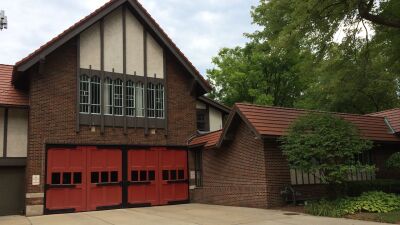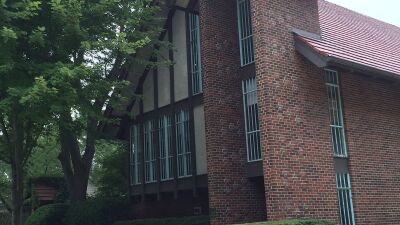GROSSE POINTE CITY — Although it’s not widely used, a unique service in Grosse Pointe City — rear yard trash collection — remains in place for the 2023 to 2024 fiscal year, which started July 1.
Facing a budget shortfall, officials had planned on eliminating rear yard pickup to save money and reduce the impact this service has on their limited staff, but residents who use the service — including seniors and some condominium residents who don’t have great alternatives when it comes to getting trash to the curb — voiced staunch objections to the proposal this spring, leading the City Council to reconsider.
Addressing the Grosse Pointe City Council during a public hearing on the budget May 1, Mike Torakis, president of the Rivard Park Association, said about half of the residents on his block of 70 are elderly. He spoke on behalf of his neighbors to voice opposition to eliminating rear yard pickup.
“We all don’t use the schools or the libraries or the baseball fields, but we don’t object to higher taxes (for those) because they (benefit the community overall),” Torakis said.
Another condo association leader — Mike Ryan, president of English Terraces — said that all the refuse from their complex is stored in a single garage now, where it can be easily collected by a Cushman, the vehicle used for rear yard trash collection. Ryan said it would be “a safety hazard and visual obstruction” if residents of the small complex had to put out more than a dozen trash cans and recycling bins on the curb.
Stuart Grigg, a resident of the 300 block of Rivard Boulevard, voiced his concerns as well May 1.
“We have a lot of elderly and disabled people living nearby us and it’s going to be a real (struggle for them) to get the trash out,” Grigg said.
Eliminating year yard collection would have saved the City about $33,200 annually, administrators calculated. There would have been additional savings from not having to purchase future Cushman vehicles used to travel up driveways and take trash bags from the garage to the rubbish truck at the curb as well; two such vehicles had been ordered a couple of years ago but supply chain issues mean that the City is still waiting to take delivery on those, something Public Services Director Pete Randazzo said he was last told could be later this year.
If the City hadn’t needed the Cushmans that it anticipates finally receiving this year, it could have sold them to Grosse Pointe Shores, which also offers rear yard trash collection and has struggled with the same inability to get new Cushmans.
At a special council meeting April 5, then-City Manager Pete Dame said only about 10% to 15% of residents in the City use rear yard trash pickup.
“I love the backyard pickup,” Mayor Sheila Tomkowiak said. “(But) I’m the only one on my block that uses it.”
The Grosse Pointe City Council unanimously approved the budget during a meeting May 8 after making some adjustments to retain rear yard pickup for at least another year.
Yard waste and recycling still need to be taken to the curb, as has always been the case.
Finance Director/Treasurer Kimberly Kleinow said one of the problems is that solid waste revenue hasn’t kept pace with expenditures. Because of Proposal A and the Headlee amendment, the City can’t increase the levy for solid waste, either.
“We do have problems we need to solve in terms of solid waste,” Tomkowiak said May 8.
Because of the tight budget, major expenditures this year were kept to a minimum and include the purchase of a new police vehicle, a new roof for the municipal court building and new tennis courts at Neff Park.
Kleinow said having a base of about $1 million in a capital expenditures fund would be good for the community. She pointed out that a new fire truck easily costs over $250,000 even for a smaller firefighting vehicle, while a new street sweeper is over $200,000.
“Right now, we are budgeting for any future refuse trucks out of our general (fund),” Kleinow said.
The City has switched to a longer replacement period between Department of Public Works vehicles. Rubbish trucks are now being replaced every three years instead of every two years, while DPW pickup trucks are being replaced every 10 years instead of every eight years. Officials believe the new, fully enclosed DPW facility will extend the life of these vehicles by not leaving them exposed to the elements at all times.
“The problem is, any source of (capital expenditure) funding … is any surplus we might have,” Kleinow said.
She said that amount has been going down as the surplus has gone down.
Tomkowiak said the City hasn’t had a separate line item for capital expenditures since around the time of the economic downturn in 2009.
While Kleinow said there was no Headlee millage rollback this year, the millage is slightly lower — 16.8390 mills for 2023 to 2024, compared to 16.9194 mills for 2022 to 2023 — because of a reduction in the debt millage.
State-shared revenue is up for 2023 to 2024 — the City budgeted for $682,642, an increase of $85,950 from the prior fiscal year — but that doesn’t make up for the large loss the City has sustained in this revenue source over the last two decades. Between 2003 and 2017, Kleinow said, the City has lost $2.5 million in state-shared revenues.
The City’s five-year financial projections, released in January, show the community’s expenditures outpacing revenues for the 2024 to 2025 fiscal year and beyond, a situation that is expected to get worse each year without either making cuts, finding additional revenues elsewhere or a combination of both.
The five-year projection includes an assumption that taxable values will rise by 4% in the 2024 to 2025 fiscal year. By state law, property tax increases are capped at 5% or the rate of inflation, whichever is lower. This year, the City benefited from a 5% taxable value increase, although the actual rate of inflation for the fiscal year was about 8%.
 Publication select ▼
Publication select ▼

























